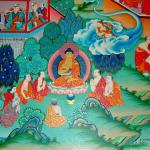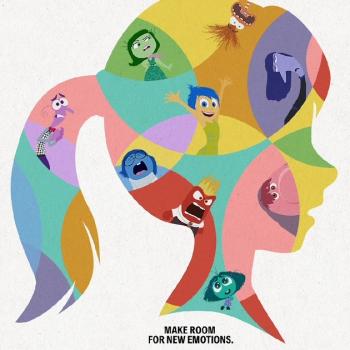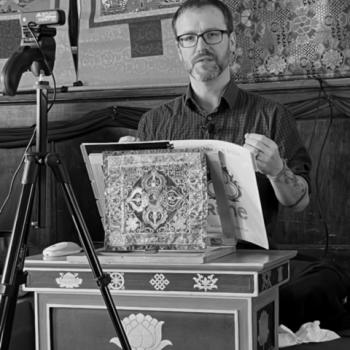At the Rime Center we do a chant every Sunday called Supplication to the Buddha. I believe that within one part of this chant we really get at what the essence of Buddhism is. It is as follows:
“Do not commit any non-virtuous actions.
Perform only perfect virtuous actions.
Subdue your mind thoroughly-
This is the teaching of the Blessed One”
In her book Buddhism for Beginners Thubten Chodron echoes the same idea with just a little different wording.
She writes, “Abandon negative action; create perfect virtue; subdue your own mind. This is the teaching of the Buddha.”
I’ve been reading “Buddhism for Beginners” lately. I haven’t read this book before and I’m helping to teach a class based on it. So I’m reading it. Sometimes I think it’s good for us to go back to the foundational teachings and just try to see them in a new way.
Stop doing bad things, do good things, get some control of your mind.
If we can stop doing things that cause harm, then we can make the world a better place for ourselves and others. We can work toward cultivating virtue by learning to develop attitudes that are rooted in love, compassion, joy, and equanimity. When we subdue our minds, we can put down our emotional baggage to see the world clearly and we can start making better choices. This can helps us be calm and peaceful and also to stop making enemies out of everything all the time.
Thubten Chodron says, “The disturbing attitudes and negative emotions, such as clinging attachment, anger, and ignorance are the real source of unhappiness. Since these are based on misconceptions about the nature of reality, they can be removed from our mindstream.”
A lot of the things that are making us unhappy come from ourselves. Our own self obsession and emotional baggage are things that take a lot of joy from us. But we can learn how to let go of these things, or at least to not hold them so tightly.
We practice Buddhism by working on the 3 higher trainings. These are:
-Ethical Discipline
-Meditative Stabilization
-Wisdom
Live an ethical life, train your mind, and learn to see things clearly. That’s how I would describe these three trainings. Each of these three is divided in what we call The Noble Eightfold Path.
Ethical Discipline:
-Right Speech: using words that are true, kind, and appropriate
-Right Activity: taking actions which don’t harm others
-Right Livelihood: obtaining a living through ways that are honest and not harmful
Meditative Stabilization:
-Right Effort: determination to counteract disturbing and negative emotions
-Right Mindfulness: countering both laziness and excitement in our meditation
-Right Samadhi: training our mind to fix one pointedly on an object
Wisdom:
-Right View: the wisdom that realizes emptiness and interconnectedness
-Right Thought: the mind can explain the path clearly to others and is motivated by wishing for freedom from suffering.
The essence of Buddhism is also contained in a teaching called the 3 Principal Aspects of the Path.
3 Principal Aspects of the Path:
-Determination to be free
-Altruistic intention (aka Bodhicitta)
-Wisdom realizing reality
Thubten Chodron says, “Initially, we must have the determination to be free from the confusion of our problems and their causes. Then, seeing that other people also have problems, with love and compassion we will develop and altruistic intention to become a Buddha so that we will be capable of helping others most effectively. To do this, we must develop the wisdom that understands the true nature of ourselves and other phenomena. This eliminates all false projections.”
And, finally, the essence of Buddhism is taking refuge in the three jewels. The three jewels are the Buddha, the Dharma, and the Sangha. Taking refuge means we are relying on these things to inspire and guide us toward a more awakened life.
The Buddha is the historical figure who founded Buddhism but also the innate potential for awakening that is within us.
The Dharma represents the teachings of the Buddha and whatever measures we’re taking to continue to develop the awakened mind.
The Sangha is the community, those other people we are practicing Buddhism with.
We rely on these three things to keep us on the path and keep us motivated to continue.
Thubten Chodron says, “When people take refuge, they clarify to themselves what direction they are taking in life, who is guiding them, and who their companions are on the path.”
Who was the Buddha?
The Buddha is the historical figure who is credited with creating the faith tradition that we call Buddhism. In Buddhism for Beginners Thubten Chodron describes the Buddha as, “A human being who lived 2500 years ago and how cleansed his mind of all defilements and developed all of his potential.”
That sounds really heavy. He fully cleansed his mind and reached his full potential. It sounds like a lot. But this fact is so important to the story. He was a person. He was not a spirit, he was not a god, he was not an angel, he was not a divine hero. He was a person. He was a very wise and determined person, but he wasn’t fundamentally different from you or me. So, we can all do what he did. This is something we can aspire to.
We are encouraged to study the Buddha’s teachings and to try them out. Then we can develop faith in them. We can cleanse our minds and reach our potential.
Thubten Chodron goes on to say, “All beings have the potential to become Buddhas, for all of our minds are innately pure. At the present they are clouded by disturbing attitudes, negative emotions, and contaminated actions. Through consistent practice, we can remove these defilements from our mindstreams and nourish the seeds of the beautiful potentials we have. Thus each of us can become a Buddha when this process of purification and growth is complete.”
You get there by realizing you’re already there. Our minds are pure. We only have these things in the way, like clouds in the sky. And we’re working to see through the clouds to manifest our true nature. Our path depends on the Buddha showing us the way, but also on our own efforts. Teachers point the way, but we must walk the path ourselves.
That’s all for today. I hope exploring these foundational Buddhist teachings has been meaningful to you.
========================================================
if you want to buy Thubten Chodron’s book, you can do so here:











